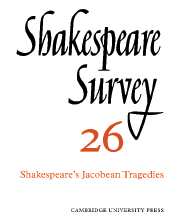Book contents
- Frontmatter
- Studies in Shakespearian and Other Jacobean Tragedy, 1918–1972: A Retrospect
- ‘Form and Cause Conjoin’d’: ‘Hamlet’ and Shakespeare’s Workshop
- The Art of Cruelty: Hamlet and Vindice
- From Tragedy to Tragi-Comedy: ‘King Lear’ as Prologue
- Jacobean Tragedy and the Mannerist Style
- ‘King Lear’ and Doomsday
- Macbeth on Horseback
- Shakespeare’s Misanthrope
- ‘Antony and Cleopatra’ and ‘Coriolanus’, Shakespeare’s Heroic Tragedies: A Jacobean Adjustment
- Shakespeare’s Venus and Adonis Sonnets
- Orlando: Athlete of Virtue
- The Unfolding of ‘Measure for Measure’
- Shakespeare and the Eye
- No Rome of Safety: The Royal Shakespeare Season 1972 Reviewed
- The Year's Contributions to Shakespearian Study 1 Critical Studies
- 2 Shakespeare’s Life, Times, and Stage
- 3 Textual Studies
- Index
- Plate section
Studies in Shakespearian and Other Jacobean Tragedy, 1918–1972: A Retrospect
Published online by Cambridge University Press: 28 March 2007
- Frontmatter
- Studies in Shakespearian and Other Jacobean Tragedy, 1918–1972: A Retrospect
- ‘Form and Cause Conjoin’d’: ‘Hamlet’ and Shakespeare’s Workshop
- The Art of Cruelty: Hamlet and Vindice
- From Tragedy to Tragi-Comedy: ‘King Lear’ as Prologue
- Jacobean Tragedy and the Mannerist Style
- ‘King Lear’ and Doomsday
- Macbeth on Horseback
- Shakespeare’s Misanthrope
- ‘Antony and Cleopatra’ and ‘Coriolanus’, Shakespeare’s Heroic Tragedies: A Jacobean Adjustment
- Shakespeare’s Venus and Adonis Sonnets
- Orlando: Athlete of Virtue
- The Unfolding of ‘Measure for Measure’
- Shakespeare and the Eye
- No Rome of Safety: The Royal Shakespeare Season 1972 Reviewed
- The Year's Contributions to Shakespearian Study 1 Critical Studies
- 2 Shakespeare’s Life, Times, and Stage
- 3 Textual Studies
- Index
- Plate section
Summary
It is difficult to know how to start this retrospect, how to decide what to include, what to leave out. It is today almost impossible to write about Shakespeare without making some reference to his Jacobean contemporaries and successors, or to write about any of them and yet omit mention of their supreme fellow. Webster and Ford, to take the two most obvious examples, manifestly echo patterns and speeches that they found in him; Fletcher, with or without Beaumont, delighted in giving us ingenious variations on what he offered. In comedy Jonson made a commensurable contribution to his successors’ writing, but in tragedy there was only one fount from which the Jacobeans and Carolines drew their life-blood. Only Chapman, perhaps, is almost entirely sui generis: the rest, even when they are most different from Shakespeare, as for example Fletcher is, are writing with Shakespeare to some extent in mind. Moreover, any book or article on the nature of tragedy itself can hardly be written without bringing in more than one early seventeenth-century dramatist. So what can be offered here comprises only a few comments on the way that, in the writings of the last fifty years, the critic or historian has linked in his mind the major tragedies of Shakespeare and other tragic drama from around 1600 to the closing of the theatres.
- Type
- Chapter
- Information
- Shakespeare Survey , pp. 1 - 10Publisher: Cambridge University PressPrint publication year: 1973



